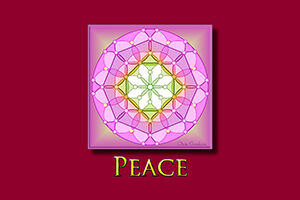Meditation
How to Practice Powerful Peace
Use the goodness, strength, and skill of your will to support peace.
Posted April 12, 2022 Reviewed by Ekua Hagan
Key points
- Peace is a practice that every person has access to and one that improves quality of life, individually and collectively.
- Holding peace as a way of life is not always passive. There are both contemplative and active ways of expressing peace.
- The warrior in oneself is most effective through the intention of peace, even when called into battle.

More than 50 years ago, an Italian psychiatrist, a colleague of Freud and Jung, wrote this: “A very important and urgent application of the use of the will is that concerning the great issue of peace and war. In my view, no amount of political agreements and treaties or of external manipulation can by itself ensure a lasting peace.”
Roberto Assagioli, the founder of psychosynthesis, goes on to note that “the effective means to change [people’s] inner attitude, both individual and collective, is the constant application of the good will. It would have the effect of a magic wand. Expressed and applied, good will automatically excludes violent conflicts and wars.” (The Act of Will)
We are used to thinking about Will in terms of strength. Most of us get caught there, often giving ourselves a hard time when we don’t have enough “willpower” to slog through yet another inner or external “should." Often, that experience flips us into feeling hopeless and helpless, whether in the small world of our own private lives or the larger world of our social and global concerns.
Will is a function of strength, skill, and goodness
Our individual and collective Will has the capacity and ultimately the necessity of operating in all its aspects. Simply stated, these are strength, skill, and goodness. We have seen too many times how strong Will without goodness is a dangerous thing. Likewise, good Will, without skill, may be ineffective. But how wonderful it is to experience acting through all the aspects of the Will so that the outcome of our choices is bound deeply in goodness, negotiated through skill, and manifest through the needed strength.
As we face another international conflict, in which there are perpetrators and victims, good guys and bad guys, acts of horror and acts of courage, love, sacrifice, and more, we need to claim our own right and responsibility towards holding a powerful peace in our hearts, our minds, and our actions.
Holding peace requires strength, skill, and goodness. It requires our Will. It is all too easy to settle into a right-versus-wrong point of view, which can give us the comfort of feeling some certainty. But look at what this “comfort zone” creates: polarization, blame, exclusion, and ultimately a lack of empathy or capacity to see a larger view.
Will is not neutral, and peace is not passive
This is not, however, an invitation to be neutral. When it is time to vote, we vote for the people we think are best suited, based largely on our own deeply held values. We will also feel free to take a stand, as needed, as we are called by our deep values and life purpose to do so. This might mean writing a letter to the editor, joining in a peaceful demonstration, or giving money to causes we value. It might call us to take up arms because the cause is too great, the fight is too close, or the urgency of acting on our values is that great.
When we are called to be a warrior, all of our Will must be aligned. The warrior role may be standing up to a bully, challenging a morally unacceptable comment, speaking the truth we need to express, or even, in these oh-so-difficult days, getting out of bed to face the day with our goodness, strength, and skill. Even that is often a warrior’s task! And for some, being a warrior is a life’s path. What we all so fervently wish for is that those warriors are guided by their own wisdom and good Will, as well as their strength and skill.
Holding peace invites the best of us, no matter who we are and no matter what actions we are taking. Sitting in meditation, can we breathe peace? Is the laundry an annoying chore, or a peaceful act of living? As we vote, are we angry, afraid, self-righteous, or can we offer our ballot with peace? And if and when we take a public stand, a demonstration, a resistance, a choice to enter into the fray (whatever it may be) or give up our safety to help preserve others’, can we hold peace, even in danger?
Remember, peace is not passive. It is not surrendering or weakness. Some of our greatest visionaries have shown us the power of peace. As psychosynthesis reminds us: the good will is a magic wand. If goodness permeates our heart, mind, and actions, we can be strong, assertive, and truthful. We can take a stand. And we can rest, breathe deeply, practice self-care, and live our love.
This is an amazing inner truth: our good, strong, and skillful Will carries all possibilities. And as we internalize the power of peace, even in our fraught and chaotic moments—of which there are many—we will each help to build that world where peace is the bedrock.
How to build inner peace as an act of will
All easier said than done, of that I am aware. I offer three strategies to help us build inner peace as an act of Will. First, let us remind ourselves of peace, as often as we can. It is an evocative word. Let that word show up on a sticky note on the fridge, in our own inner self-talk, in the way we organize our desks so that even that reminds us of peace.

This invites us, as a next strategy, to meditate on peace. Maybe you’re a meditator and this is an easy next step. Maybe you are not. Meditation is as simple as taking one minute, one breath, that focuses on peace.
The last strategy is based on the actions we take. So many things are difficult. So many issues are contentious. So many people annoy us! But if my outer action is peaceful, I will be a force for good.
The Will towards peace, in its goodness, strength, and skill may well guide us to a next step that serves us all.
References
Assagioli, R. (2007). The Act of Will. Synthesis Center Press. Amherst. MA.




